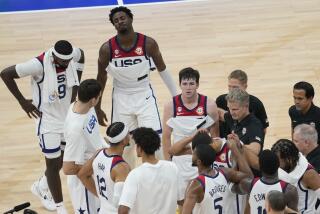Dream Matchup Finally Here, but Was It Worth the Wait?
- Share via
YOKOHAMA, Japan — There are many reasons, of course, why American football--also known in this part of the world as “helmet football” or “gridiron” or “sumos in shoulder pads”--will never match the global popularity of its older, subtler cousin.
Too much cumbersome equipment.
(American football players wear protective gear on their heads, in their mouths, around their necks, over their shoulders, in front of their kidneys, around their hips, over their thighs and on their knees. Everywhere, basically, except the shins, which is the only part of the anatomy global football players see fit to pad.)
Too many delays in the action.
(Delays for huddles. Delays for incomplete passes. Delays for first downs. Delays to allow the doubled-over defensive lineman time to catch his breath after trudging eight yards and flopping on top of the opposing fullback. Far too much stoppage.)
Not enough sex appeal.
(Ask the women of the world whom they’d rather spend an evening with--David Beckham or David Carr? Answer the women of the world when they reply: a) “Who’s David Carr?” b) “Where’s Houston?” and c) “What’s a Texan?”)
The bowl championship series.
(Try explaining that one to a Brazilian. “You mean to say you get run off the field in group play, you disgrace yourselves, your family, your community and your country ... and after all this, you advance to the final?”)
On the other hand, it never would have taken American football 72 years to figure out a way to put its two best teams on the same field during the playoffs.
The World Cup, proving conclusively that it does get around to all things eventually, will bring the two most storied teams in its history, Brazil and Germany, together for the first time in 17 tournaments in Sunday’s final at Yokohama International Stadium.
That’s right. Four-time champion Brazil, top-ranked in all-time World Cup winning percentage, and three-time champion Germany, ranked No. 2, are finally playing each other in a World Cup game after having played 170 World Cup matches against everybody else.
When this incredible statistic first began filtering through the press centers of Japan and South Korea, the international soccer media, for the first time on record, had the same reaction.
How did that happen?
Before this tournament, the World Cup had staged 16 finals. Brazil had appeared in six. Germany had appeared in six. Since World War II, either Brazil or Germany had appeared in every final except the one in 1978.
But never in the same final. Or in the same group game, or in the same second-round match, or in the same quarterfinal or semifinal.
“For football fans, it’s a dream final,” says Oliver Kahn, the redoubtable German goalkeeper. “It’s the final everyone had been hoping for.”
A Rio de Janeiro newspaper, Une O Globo, is calling it “the final of all cups ... the most-awaited World Cup final in history.”
Not that this is necessarily a good thing. How long a wait is too long a wait?
Welcome to the Cowboys and the Redskins of international soccer. Two programs that once ruled their sport, but now look, feel and smell well past their pull dates. Two old-school powers that peaked decades ago.
Except the Cowboys and the Redskins have been known to meet in the tournament from time to time.
Where was this final in 1970, when Pele and Franz Beckenbauer were at the height of their skills, instead of playing the roles of grouchy middle-aged men complaining about the substandard Brazilian and German play at every stage of this tournament?
Or how about in 1986, when Rudi Voeller was scoring highlight-reel goals for Germany, instead of sitting in dark film rooms, devising ways to choke the life out of every World Cup match his team has played in Asia?
It should have happened in 1970, when both Brazil and Germany reached the semifinals. Brazil advanced with a 3-1 victory over Uruguay, but Germany, hitting the wall in ugly fashion during a hot Mexican summer, coughed up three overtime goals to Italy and fell short of the final, 4-3.
It should have happened in 1986, when the Germans reached the semifinals and waited for Brazil to join them. But Zico missed a penalty shot in the second half, Socrates missed an open net in overtime and Brazil lost in a shootout, France going on to play Germany instead.
And it might have happened in 1958, when a 17-year-old Pele led Brazil to its first world championship. Germany reached the semifinals, where it scored the first goal against Sweden, but surrendered two goals in the last 10 minutes and wound up playing instead in the third-place match.
Aside from that, Brazil and Germany, the yin and yang of global soccer, had never come close to meeting in a World Cup. Most often, they were victims of their own talent and reputations--seeded into different first-round groups and slotted into opposite later-round brackets.
Timing has also been a problem. Brazil hit its 1990s upswing, reaching the ’94 and ’98 finals, just as Germany’s Lothar Matthaeus-Jurgen Klinsmann champions of ’90 began showing their age. Germany reached three consecutive finals--in 1982, ’86 and ‘90--while Brazil was mired in its blue period, in the midst of a 24-year, no-finals slump.
Now they’ve both finally made it, finally broken through to the same side, and the prevailing mood is more exhaustion than excitement.
We’re tired of watching Brazil make eye-popping mistakes in the back, of surrendering the ball in the midfield, of peppering Turkey’s goal with all sorts of shots from all sorts of ranges and converting only one--an ad-libbed toe-poke that Ronaldo all but apologized for.
“It’s not a marvelous side,” Brazil Coach Luiz Felipe Scolari said of his squad after the 1-0 semifinal victory in Saitama, “but it’s competitive.”
Not flamboyant. Not artistic. Not imaginative. Competitive.
We’ve also grown tried of watching Germany do just enough--and nothing more--to eke out 1-0 victories over the likes of Paraguay, the United States and South Korea. Keep lobbing in the long balls, hope someone wearing a white shirt gets a head on one of them, turn the thing over to Kahn.
“Germany is a traditional, cold, calculating team,” Scolari said. “That’s why we have an enormous amount of respect for them.”
But is that the kind of team soccer wants hoisting its biggest prize Sunday?
And is the other option, a faded replica of a musty old masterpiece, any more preferable?
It has taken the World Cup 72 years to bring Brazil and Germany to this stage. After the last ball is kicked inside Yokohama International Stadium, will the waiting be remembered as the hardest part? Or the watching?
*
(BEGIN TEXT OF INFOBOX)
*--* Winning Traditions Sunday’s final marks the seventh for each country. Championships shaded: BRAZIL GERMANY 1950 1970 1954 1982 1958 1994 1966 1986 1962 1998 1974 1990
*--*
More to Read
Go beyond the scoreboard
Get the latest on L.A.'s teams in the daily Sports Report newsletter.
You may occasionally receive promotional content from the Los Angeles Times.










